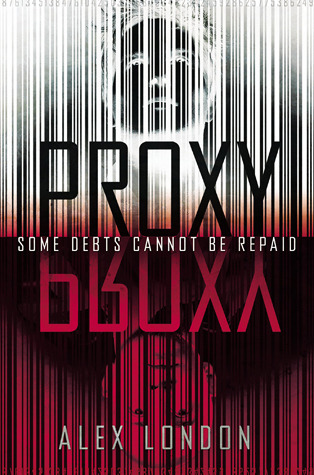
This book has a pretty good rating on Goodreads (3.92/5), and has been recommended for YA Dystopian fiction with LBGT characters. It didn’t work for me or Dany though, so we’re doing five things we learned from this reading experience. This means, it’s more of a writer’s post than anything, so bare that in mind.
Five Things We Learned from Proxy:
- Research, research, research.
Dany: Diversity is important — Diversity needs to be researched. Putting in “diverse” characters when all of them are just full of clichés, sexism, heteronormativity, racism etc. is NOT diversity.
Proxy has a POC-LGBT main character. We thought this was going to be awesome! A gay character who wasn’t white! This book didn’t get the free space on our bingo card! But, as with everything, adding diversity doesn’t really do anything if the diversity is poorly researched and based on racism and cliches. It started out as mildly worrying, when Chinese characters were stereotypically portrayed, but got worse and worse as the book went on. It was clear the author was a white, straight man, by the time you got to the third chapter.
Diversity should be something we think about, if only so we don’t perpetuate the myth of the future being all white, but if you’re writing about cultures that aren’t your own, research. It’s not even hard these days — do a google search! Tumblr has resources! Don’t rely on diversity to carry your story, don’t rely on cliches and racism to carry your story. Always research! - Learn the rules of writing. Point of view is a fairly important part of reading. Where the reader stands in relation to the text is a distance that can tell you a lot about how you’re supposed to interact with a character. This book was written in third person omniscient. This wouldn’t be a problem, if London had provided context clues to indicate as such. Instead, in the space of two pages, you jump four or five times between three different character’s heads. Prior to this, you had two separate point of views, and so suddenly the reader is thrown. At this point, you’re 25% of the way through the book. The point of view should not be changing, and definitely should be done with better skill. This wasn’t the only technical issue London had though.
- Consistency.
Dany: Consistency in your world building, in your storytelling, in your characterization. Consistency is important everywhere basically.
Both Dany and I noticed that there was no internal logic to the world London created. At times, no one knew what the past was like, and the mysterious outside world. Then a few pages later, they would know plenty of things that were necessary for the story to move forwards (and sometimes not, sometimes it was just random). It was extremely frustrating to have a total lack of consistency in the world building, and it made connecting to the characters hard.
In any book, but especially in sci-fi/fantasy, there is a necessity to ground readers in the reality of where they are with concrete details that place you. This book never tried to ground it’s over the top world, so quickly you lost interest in the characters and plot. - Character Motivations Not only was there no consistency, but there was no motivation that made sense. Motivations seemed to change on the drop of the hat, based on what the author needed. Character motivations are the place you can ground a book. You might not be able to understand the apocalyptic world’s rules, but you can understand the need to protect people, to want to find somewhere safe, to be free to create. This is the touchstone you should come back to. That is where you will get people to like your characters. Syd didn’t want anything, and so he was too bland and easy to forget. Knox’s want was pretty cliche, but at least you could understand it, and it made him the “stand out” character. Despite still being as flat as cardboard, and about as interesting as it too.
- Don’t let the concept eat the story. Proxy‘s promises were intriguing. A world where debt is paid by others seems like a great way to critique the problems with credit, and capitalism. Unfortunately, London seemed to dig too deep into the idea, and got lost. His critique became heavy handed, and he lost focus on the important details of the story — characterization and writing an understandable story. Lacking either of those, Proxy comes off weak, and ineffectual. In fact, it’s simply dull.
All right, let’s play bingo!

Proxy got Bingo filling in almost half the board, despite not managing to get the freebie square. There are plenty of good books that would fill in the same number of squares, but with its failings, the novel crumbles under the weight of all these cliches.
Dany’s rating: 1/5 stars
Rosey’s rating: 1/5 stars